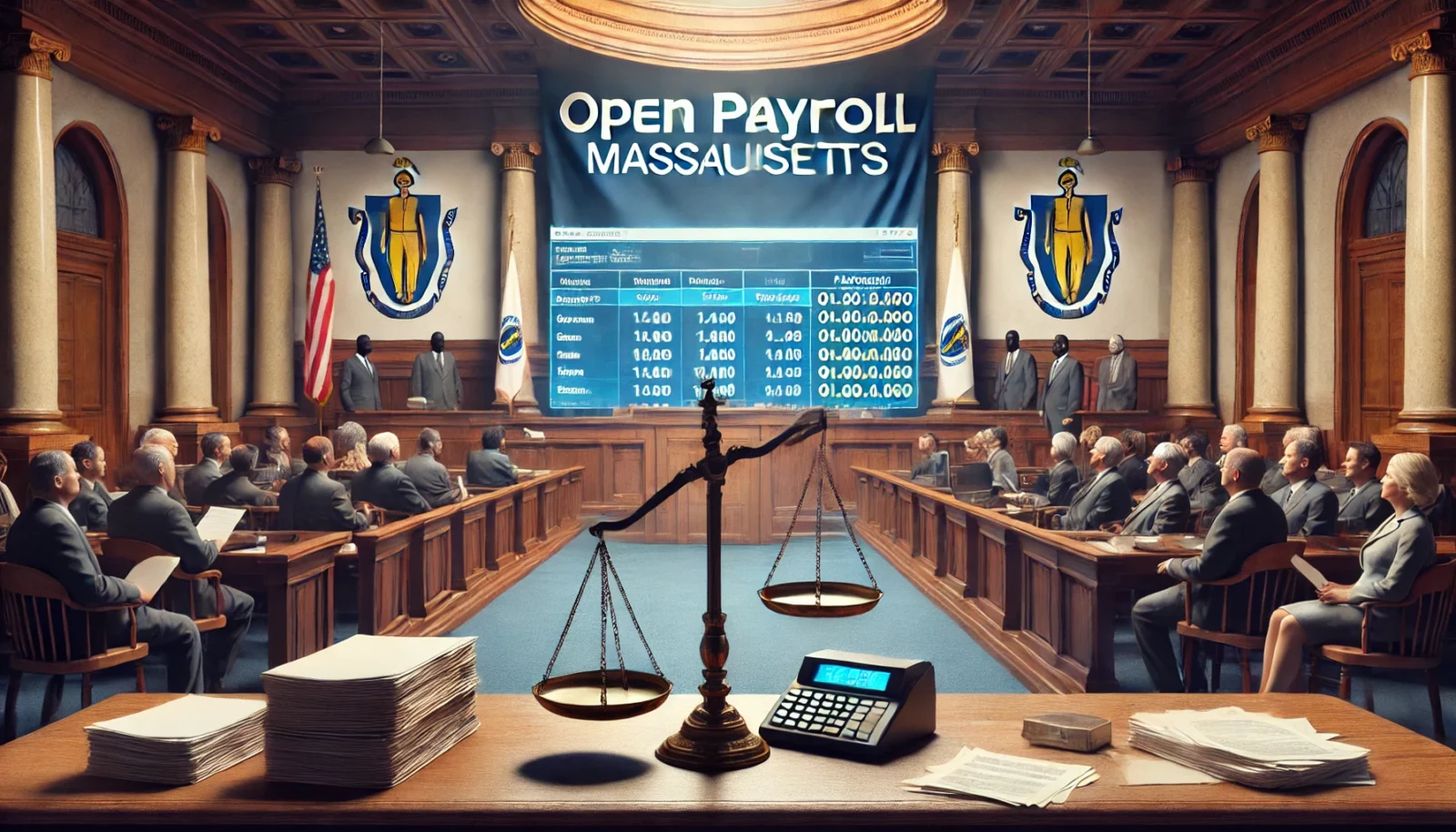Introduction to Open Payroll and Its Role in Massachusetts
Open Payroll is a system that shows how much public employees are paid. This information is shared with the public so everyone can see it. The goal of Open Payroll is to make sure the government is honest and open about how tax money is spent. In Massachusetts, the Open Payroll system allows people to view salaries of workers in state agencies, schools, and other public jobs.
The purpose of Massachusetts’ Open Payroll system is to help the public understand where their money goes. It helps track whether public employees are being paid fairly. Also, it shows if there are any problems, like paying too much or not paying enough.
The open payroll massachusetts lawsuit system is important for government transparency. It makes it easy for citizens to see how the government uses funds for employee salaries. This system gives people confidence that tax money is spent wisely and fairly. It also helps make sure there are no hidden issues in the pay system.
What Led to the Massachusetts Open Payroll Lawsuit?
Background on the Lawsuit
The Massachusetts Open Payroll lawsuit began when some public employees were concerned about their salary information being shared publicly. They believed this sharing violated their privacy and could cause personal risks. This led to legal actions challenging the fairness of the Open Payroll system.
Key Events or Decisions Leading Up to the Legal Action
The lawsuit started after complaints from employees who argued that their personal data should not be displayed for everyone to see. They claimed that this system could expose them to identity theft and other risks. Public discussion grew, and soon employees and unions took legal steps to protect their rights.
Major Parties Involved (Government, Employees, or Other Stakeholders)
The main parties involved in this lawsuit are government agencies responsible for maintaining the Open Payroll system and the public employees whose information is displayed. Additionally, labor unions representing these workers also joined the legal battle, supporting the claim that the system could harm their members. The Massachusetts government argues that the system is essential for maintaining government transparency.
The Legal Grounds of the Lawsuit
Legal Claims Raised in the Lawsuit
The Massachusetts Open Payroll lawsuit is centered on privacy concerns. The public employees involved in the case argue that sharing their salary details violates their right to privacy. They believe that their personal information should not be made public without their consent. There are also concerns about wage discrepancies, where some employees feel their salaries are unfairly compared with others in a public setting.
Relevant Massachusetts Laws or Regulations That Come into Play
The lawsuit involves specific Massachusetts laws related to public records and privacy. The Massachusetts Public Records Law allows for transparency in government, but employees argue that this law conflicts with their right to personal privacy. The lawsuit challenges how the state balances transparency with protecting personal information.
Importance of the Lawsuit for Other Similar Cases
This lawsuit is important because it could set a precedent for how other states handle Open Payroll systems. If the court sides with the employees, it could lead to changes in how salary information is shared across the country. This case is being closely watched as it could impact other public employees who are concerned about privacy and fairness in the workplace.
Key Stakeholders in the Lawsuit
Who Are the Plaintiffs and Defendants?
The plaintiffs in the Massachusetts Open Payroll lawsuit are the public employees who are challenging the public release of their salary information. They claim that this system violates their privacy rights. On the other side, the defendants are the Massachusetts government agencies responsible for maintaining and enforcing the Open Payroll system.
Role of Massachusetts Government Agencies
The Massachusetts government agencies play a key role in the lawsuit as they are the ones who manage and run the Open Payroll system. They defend the system as necessary for ensuring government transparency and believe that public access to salary data is important for accountability.
Involvement of Labor Unions, Public Employees, or Other Organizations
Labor unions representing public employees have also joined the lawsuit, supporting the plaintiffs’ concerns about privacy and fairness. These unions argue that the public sharing of employee salaries could harm their members. Other organizations that advocate for transparency and open government are likely watching the case closely, as the outcome could impact future decisions on public access to government information.
Impact of the Open Payroll Lawsuit on Public Employees
Concerns Raised by Public Employees
The primary concern raised by public employees is their right to privacy. They argue that the public release of their salary details without consent exposes them to risks like identity theft or unwanted attention. Many feel uncomfortable with their financial information being available for everyone to see, especially when it can be easily accessed online.
How the Lawsuit Affects Government Workers’ Wages and Payroll Data
The lawsuit has brought attention to how the government workers’ wages are displayed publicly through the Open Payroll system. If the court sides with the employees, it could lead to changes in how this data is handled, potentially limiting the amount of personal payroll information that is shared with the public. This could affect how the state reports wages in the future.
Privacy Concerns Related to Publishing Payroll Information
One of the biggest issues in the lawsuit is the privacy concern around publishing personal information. Public employees argue that making salary details public without consent violates their right to keep their financial information private. They fear that this open access could lead to personal security risks or unwanted scrutiny of their earnings, which could cause stress or harm.
Court Proceedings and Updates
Timeline of Key Legal Proceedings
The Massachusetts Open Payroll lawsuit began when public employees filed their complaint, citing privacy concerns. Over the next few months, both sides presented their arguments in court, with the employees pushing for changes to the Open Payroll system. The lawsuit has seen several hearings and motions as the court considers the balance between government transparency and employee privacy.
Major Court Decisions and Rulings So Far
So far, there have been no major final rulings in favor of either side. However, the court has acknowledged the validity of the privacy concerns raised by the employees. Several temporary measures may have been put in place, such as limiting certain sensitive information while the case continues. Both the plaintiffs and defendants have presented their arguments, and the court has yet to issue a conclusive judgment.
Current Status of the Lawsuit (If Still Ongoing)
As of now, the lawsuit is still ongoing. The case remains under review as both sides continue to make their arguments. The court’s final decision is expected to have a significant impact on how the Open Payroll system functions in the future, especially in relation to privacy rights for public employees.
Potential Outcomes and Implications
Possible Outcomes of the Lawsuit
There are two main possible outcomes for the Massachusetts Open Payroll lawsuit. The court could rule in favor of the public employees, leading to changes in how payroll data is shared, possibly restricting public access to certain information. Alternatively, the court could side with the Massachusetts government, allowing the Open Payroll system to continue as it is.
What a Ruling For or Against the Open Payroll System Would Mean for Massachusetts
If the court rules in favor of the employees, it could result in limiting or even stopping the public release of payroll information for certain workers, protecting their privacy. This could reduce transparency but increase protection for personal data. If the ruling favors the Open Payroll system, the current practice of sharing payroll details will continue, ensuring government transparency but potentially exposing employees to privacy concerns.
Broader Implications for Government Transparency and Employee Rights
This lawsuit could have far-reaching effects beyond Massachusetts. A ruling in favor of the employees could lead other states to reconsider their Open Payroll systems, potentially rolling back transparency efforts. On the other hand, a decision supporting the state’s transparency efforts could strengthen government transparency nationwide but may raise concerns about balancing it with employee rights to privacy.
Expert Opinions and Public Reactions
Reactions from Legal Experts, Government Officials, and the Public
Legal experts have been divided on the Massachusetts Open Payroll lawsuit. Some believe that the case raises important questions about the balance between privacy and transparency, while others argue that transparency in government spending is essential. Government officials generally support the Open Payroll system, emphasizing its role in maintaining accountability. The public reaction is mixed, with some citizens backing the need for transparency in government operations, while others express concern for the privacy rights of public employees.
Opinions from Transparency Advocates and Privacy Activists
Transparency advocates strongly support the continuation of the Open Payroll system, stating that it ensures public oversight of how taxpayer money is used. They argue that government openness helps prevent corruption and inefficiency. On the other hand, privacy activists stand with the public employees, stressing that sharing personal salary information violates basic privacy rights. They argue that transparency can be maintained without revealing individual employee details.
Statements from Unions or Labor Representatives
Unions and labor representatives have voiced their concerns over the Open Payroll system. They argue that making employee salary data public can expose workers to unnecessary risks, including identity theft and discrimination. Many union leaders have called for a more balanced approach, suggesting that payroll transparency should not come at the expense of employee privacy.
Similar Cases Across the United States
Comparisons with Other States That Have Faced Similar Lawsuits
Several other states have faced lawsuits similar to the Massachusetts Open Payroll lawsuit. In states like California and New York, public employees have also raised privacy concerns about the release of their salary information through Open Payroll systems. In some cases, courts have ruled in favor of transparency, allowing the continued public release of payroll data. However, other states have modified their policies to protect employee privacy, especially in cases involving sensitive job roles like law enforcement or public safety.
How the Massachusetts Lawsuit Fits Into Broader National Discussions on Payroll Transparency
The Massachusetts Open Payroll lawsuit is part of a larger national debate over the balance between government transparency and employee privacy. Across the U.S., states are grappling with the challenge of keeping the public informed about government spending while protecting the personal information of public employees. The outcome of the Massachusetts case could influence future policies nationwide, either strengthening the push for full payroll transparency or leading to more protective measures for employee privacy. The case is being closely watched as it may set a precedent for other states dealing with similar issues.
Conclusion
The Massachusetts Open Payroll lawsuit highlights the ongoing tension between the need for government transparency and the privacy concerns of public employees. As the case unfolds, the court’s decision will have significant implications for both sides. A ruling in favor of the employees could limit the public release of payroll data, protecting individual privacy but potentially reducing transparency. On the other hand, supporting the Open Payroll system would maintain full access to government salary information but may continue to raise privacy concerns. This lawsuit is not only critical for Massachusetts but also plays a key role in shaping national discussions on how to balance transparency and privacy in public payroll systems across the U.S.
Frequently Asked Questions (FAQ)
What is the Massachusetts Open Payroll system?
The Open Payroll system in Massachusetts is a public platform that provides detailed salary information about public employees. It is intended to promote government transparency by showing how taxpayer money is spent on wages.
Why are public employees suing over the Open Payroll system?
Some public employees are suing because they believe the Open Payroll system violates their privacy by sharing their salary information without their consent. They are concerned that this could lead to personal risks like identity theft or discrimination.
What are the legal claims in the Open Payroll lawsuit?
The main legal claims involve privacy concerns. Employees argue that their financial information should not be publicly accessible. Some also raise concerns about wage discrepancies, saying that public access to salaries could lead to unfair comparisons and judgments.
How does this lawsuit affect government transparency?
If the lawsuit results in restrictions on sharing payroll information, it could reduce the level of government transparency. On the other hand, maintaining the Open Payroll system in its current form keeps government spending open to public scrutiny.
What might happen if the employees win the lawsuit?
If the court sides with the public employees, the state may have to limit or stop the public release of certain salary information, particularly for sensitive roles. This would protect employee privacy but could reduce the amount of data available to the public.
How does this case compare to similar lawsuits in other states?
Similar lawsuits have occurred in states like California and New York, where public employees also raised privacy concerns about salary data being shared. The outcomes have varied, with some states maintaining full transparency and others adjusting their policies to protect employee privacy.
What are the broader implications of this lawsuit?
This lawsuit could set a precedent for how states across the U.S. handle payroll transparency and employee privacy. A ruling in favor of transparency could encourage other states to keep their systems open, while a ruling in favor of employee privacy might lead to changes in how salary data is shared nationwide.
Read For More Amazing Blogs Law Firm Genius.
















Got a Questions?
Find us on Socials or Contact us and we’ll get back to you as soon as possible.